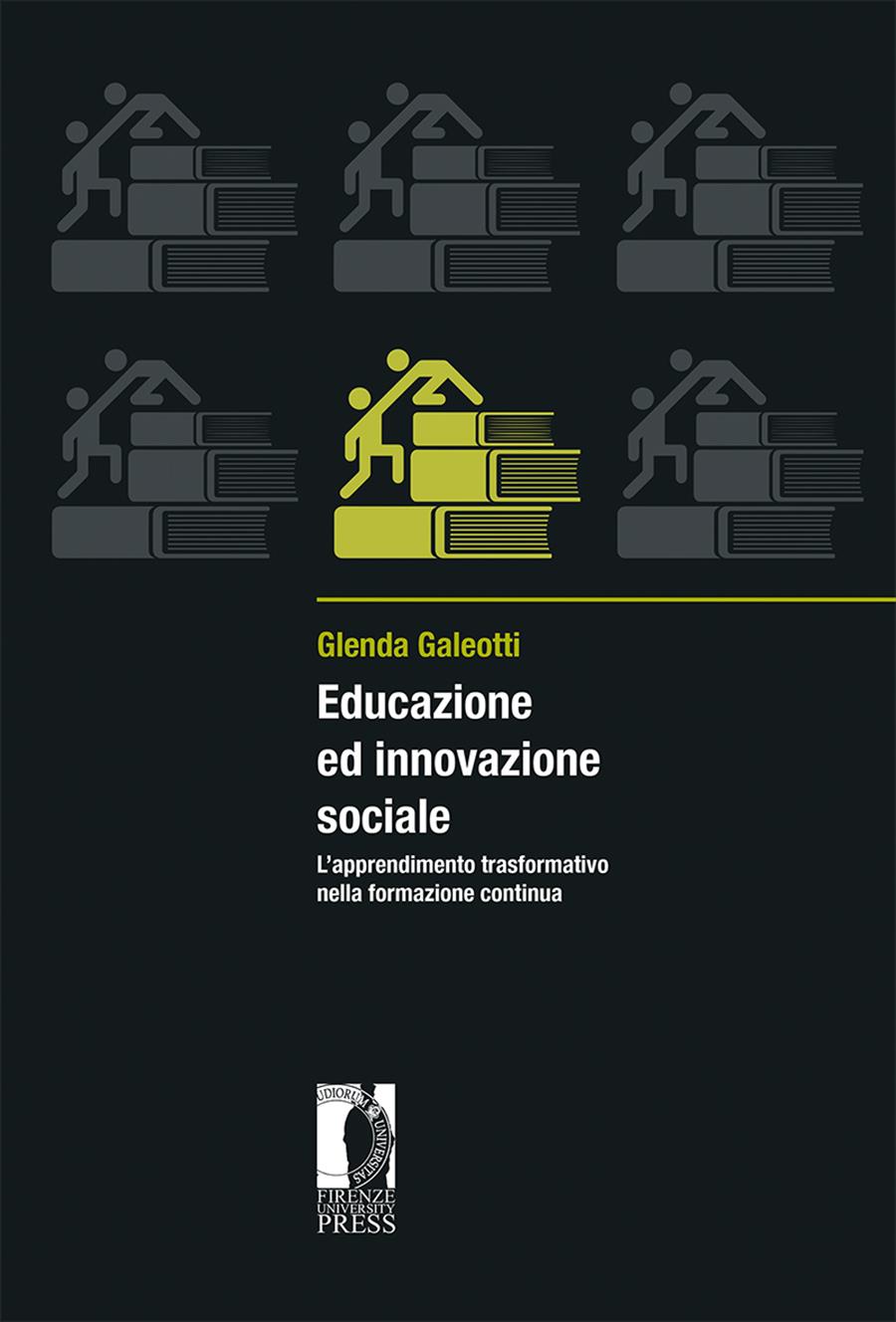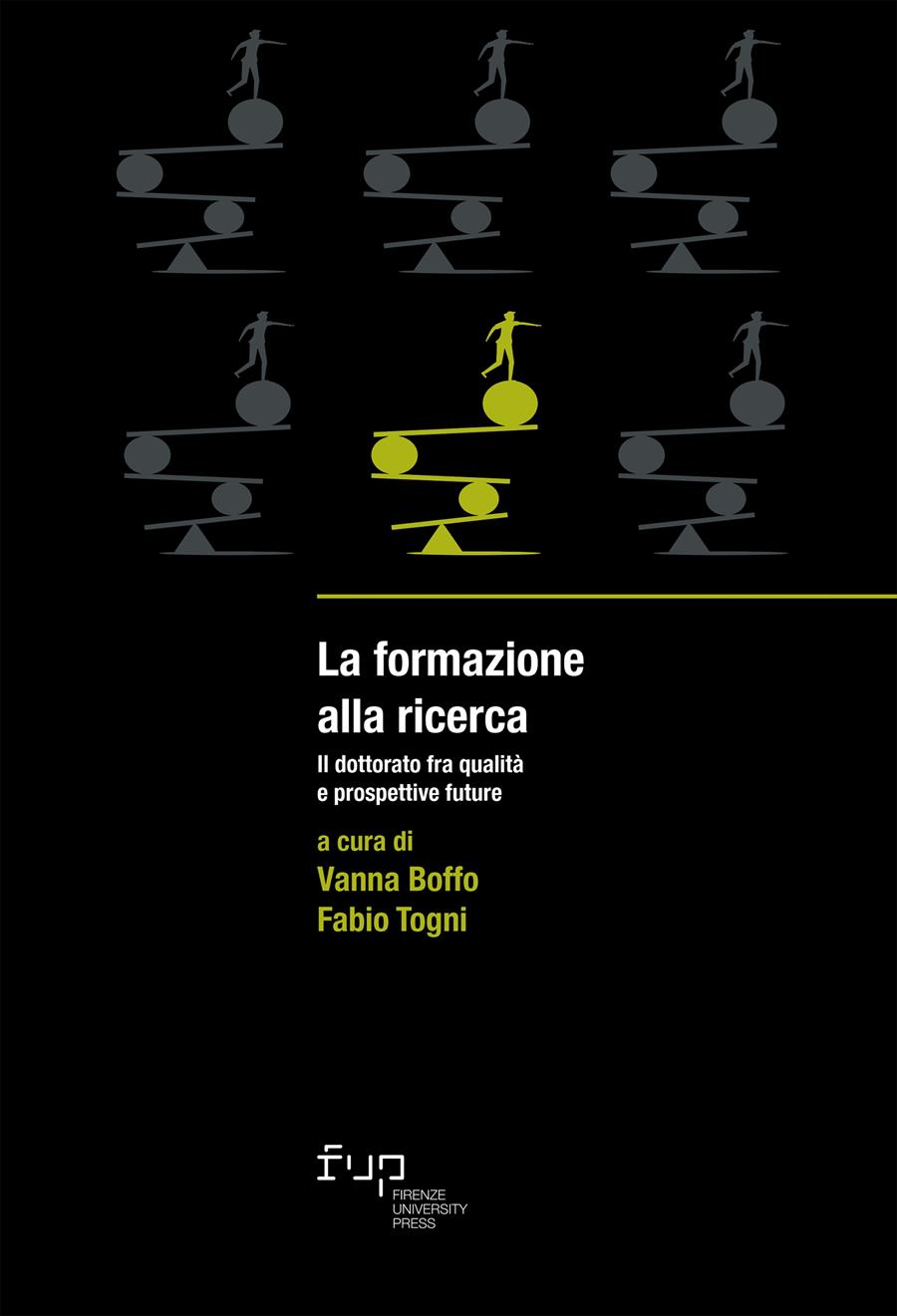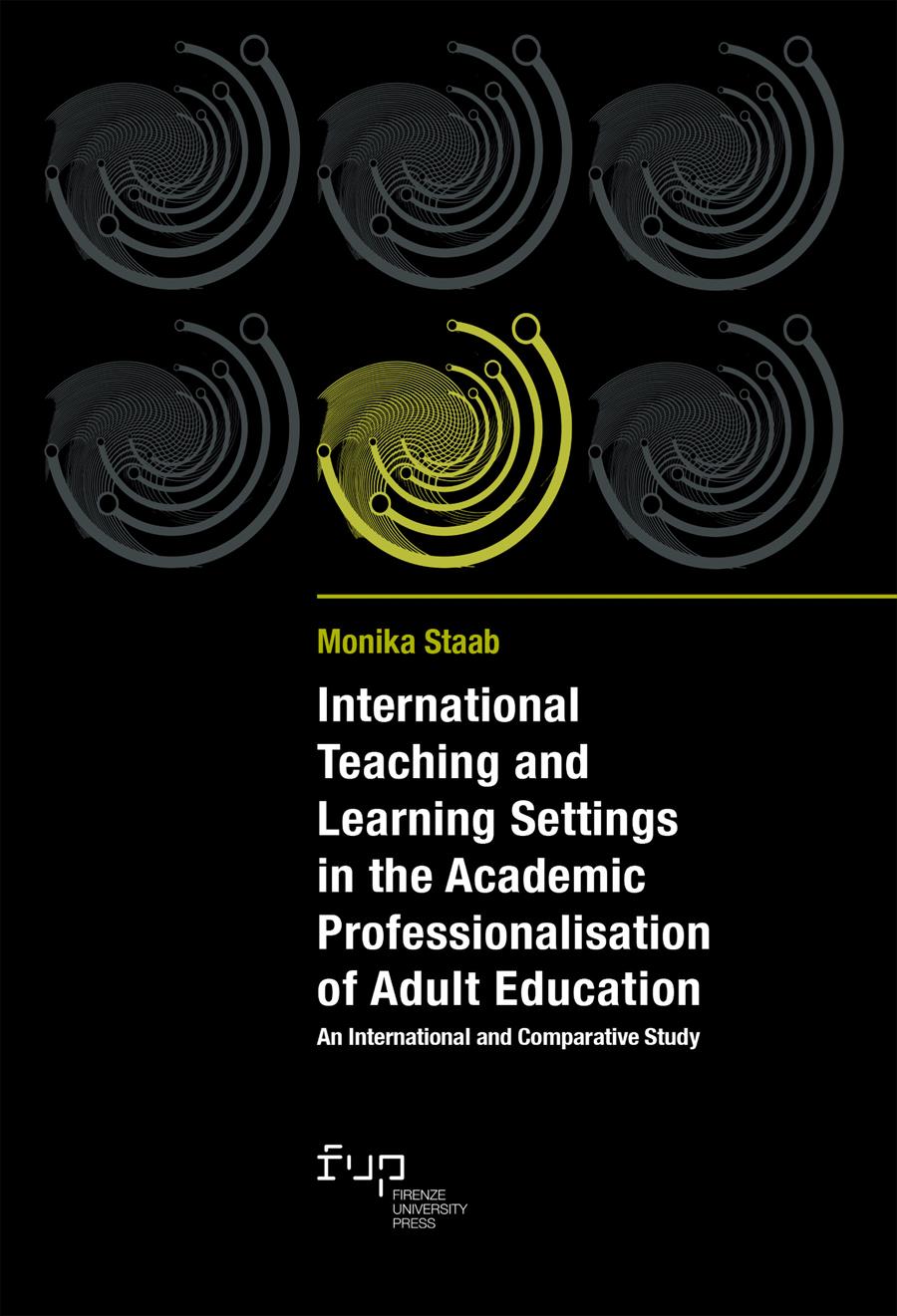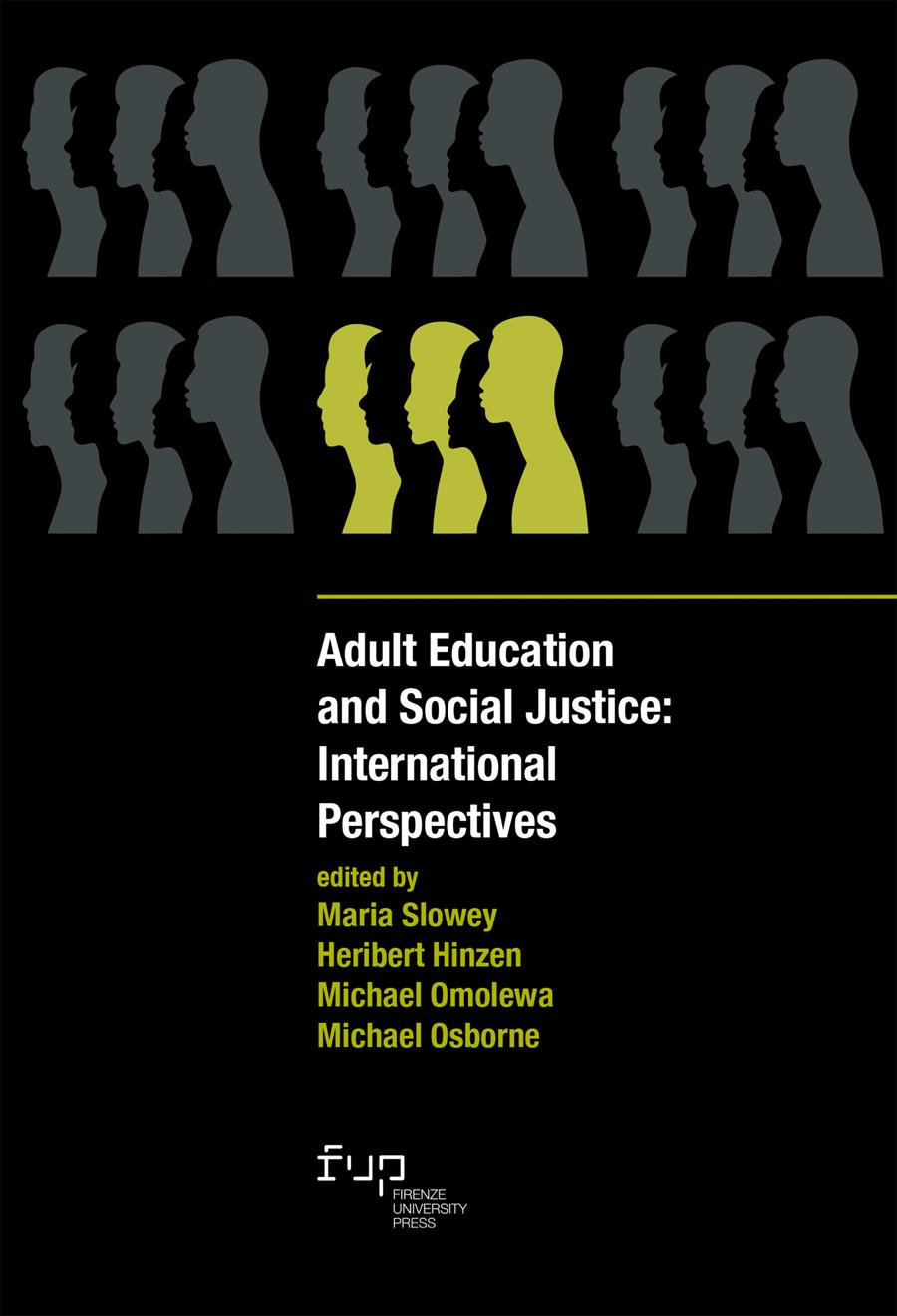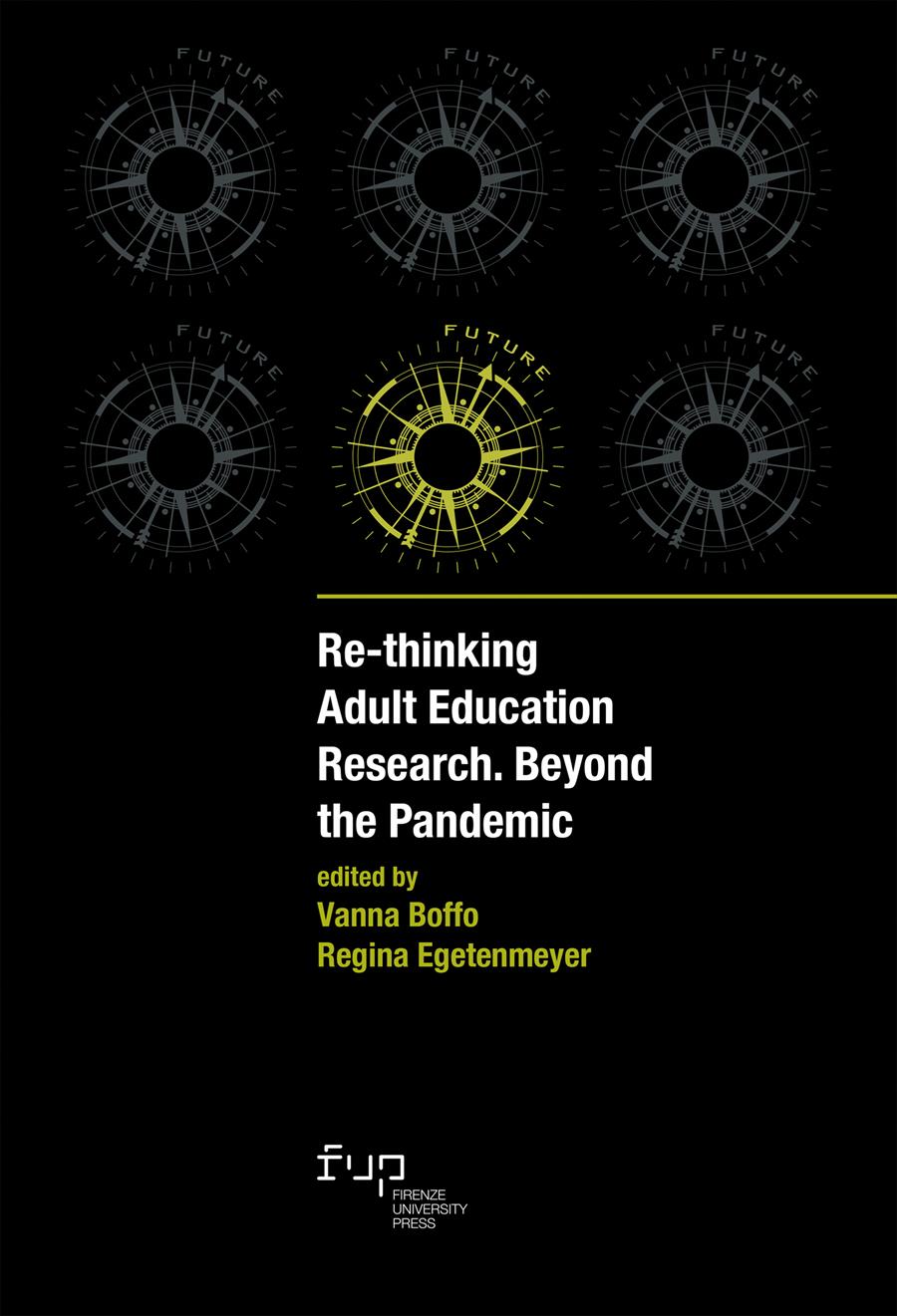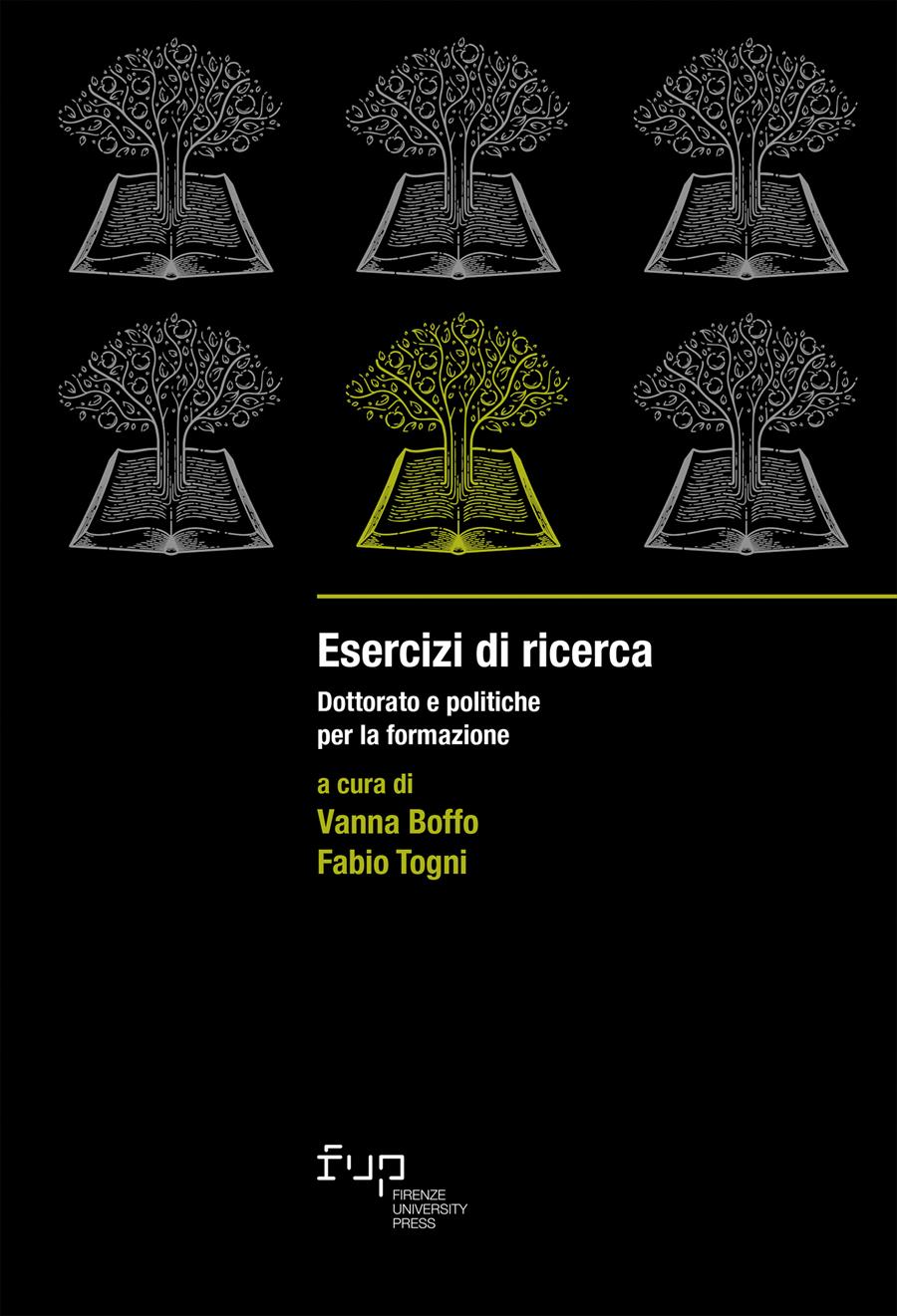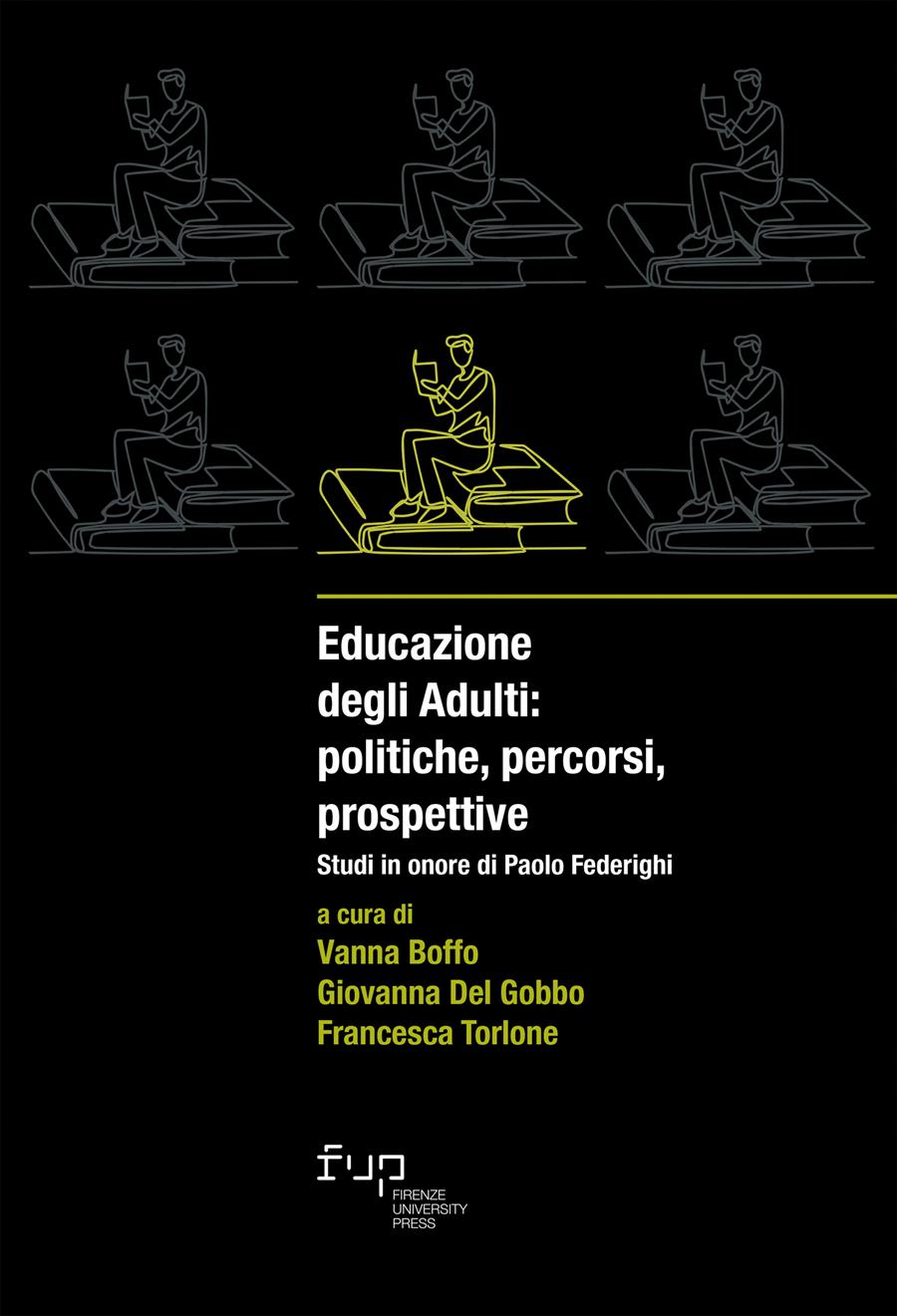Educazione ed innovazione sociale
L’apprendimento trasformativo nella formazione continua
- Glenda Galeotti,
This book proposes an interpretation of continuing education as an enabling factor of social innovation. Continuing education is an opportunity for transforming and co-creating structural and socio-cultural conditions in work contexts, through inclusive and collaborative practices and processes.
The reflection presented in the book starts from an eco-systemic analysis of educational processes entailed in the social innovation dynamics, and develops a definition of educational action for formulating and testing responses to complex social needs. The educative action, oriented to creatively combine tangible and intangible resources, individual talents, collective imagination, improves capacity to rethink educational and socio-educational services and face the challenges that reality presents.
- Keywords:
- Adult Education,
- continuing education,
- social innovation,
- transformative learning,
- transformative agency,
- social imagination,
- DOI: 10.36253/978-88-5518-092-4
- Series: Studies on Adult Learning and Education
- Scientific Board
- Language: Italian
- Subjects: Education
University of Florence, Italy - ORCID: 0000-0001-9195-2266
- Alberici A. (2008), La possibilità di cambiare, Feltrinelli, Milano.
- — (2002), Imparare sempre nella società della conoscenza, Mondadori, Milano.
- Alessandrini G. (2012), La pedagogia del lavoro. Questioni emergenti e dimensioni di sviluppo per la ricerca e la formazione, «Education Sciences & Society», 3(2), 55-72.
- Angori S. (2006), Lifelong Learning: ambiguità di una locuzione molto usata, «LLL – Focus on Lifelong lifewide learning», II (4), <http://rivista.edaforum.it/numero4/monografico_angori.html> (06/2020).
- ANPAL (2018), XVIII rapporto sulla formazione continua, <https://www.anpal.gov.it/documents/552016/586510/XVIII-Rapporto-sulla-formazione-continua.pdf/ddd263af-5fe7-e6df-0ca8-640435320e1e?t=1573127920183> (06/2020).
- Atali Z. (2010), A Brief History of the Future, Archipelago, New York.
- Argyris C., Schon D.A. (1995), Organizational Learning: Theory, Method, and Practice, Addison & Wesley Publication, Palo Alto, CA.
- — (1978), Organizational learning A theory of action perspective, Addison-Wesley, Reading, MA.
- Baldacci M. (2014), La realtà educativa e la ricerca-azione in pedagogia, «Journal of Educational, Cultural and Psychological Studies», 9/1, 387-396.
- Bandura A. (2000), Autoefficacia: teoria e applicazioni, Erikson, Trento.
- — (1986), Social Foundations of Thought and Action, Prentice Hall, Englewood Cliffs, NJ.
- — (1977), Social Learning Theory, Prentice Hall, Englewood Cliffs, NJ.
- Banks J.A., Au K., Ball A.F., Bell P., Gordon E., Gutierrez K., Valdes G. (2007), Learning in and out of school in diverse environments. Life-long, life-wide, life-deep, The LIFE Center and the Center for Multicultural Education, Washington-Seattle.
- Barca F., Casavola P., Lucatelli S. (2014), Strategia nazionale per le Aree interne: definizione, obiettivi, strumenti e governance territoriale, Materiali Uval., 31.
- Barnes M.L., Bodin Ö., Guerrero A.M., McAllister R.J., Alexander S.M., & Robins G. (2017), The social structural foundations of adaptation and transformation in social-ecological systems, «Ecology and Society», 22(4), 16.
- Barnett R. (2010), Life-wide education: a new and transformative concept for higher education?, <http://lifewideeducation.pbworks.com/f/RON+BARNETT.pdf> (06/2020).
- Barrett T. (2010), The problem-based learning process as finding and being in flow, in Innovations, «Education and Teaching International», vol. 47, n. 2, 2010, 165-174.
- Barricelli D. (2016) (a cura di), Spazi di apprendimento emergenti. Il divenire formativo nei contesti di coworking, FabLab e università, Isfol Research Paper 29.
- Barrows H.S., Tamblyn, R.M. (1980), Problem-based learning: an approach to medical education, Springer Publishing, New York.
- Bateson G. (1972), Verso un’ecologia della mente, Adelphi, Milano.
- Bassi A. (2011), Social Innovation: Some Definitions, «Boletín del Centro de Investigación de Economía y Sociedad», 88.
- Bauman Z. (2012), Cose che abbiamo in comune. 44 lettere dal mondo liquido, Editori Laterza, Roma-Bari.
- — (2002), Modernità liquida, Laterza, Roma-Bari.
- — (1999), Dentro la globalizzazione. Le conseguenze sulle persone, Laterza, Roma-Bari.
- — (1991), Modernity and Ambivalence, Polity Press, Cambridge.
- Beck U. (2000), La società del rischio, Carocci, Milano.
- Bélanger P. (2016), Self-construction and social transformation: Lifelong, lifewide and life-deep learning, UNESCO, Paris.
- — (2011), Theories in adult learning and education, Barbara Budrich Publishers, Leverkusen.
- Benjamin W. (1986), Capital of the Nineteenth Century, Einaudi, Torino.
- Billett S. (2011), Subjectivity, Self and Personal Agency in Learning Through and for Work, in M. Malloch, L. Cairns, K. Evans, B.N. O’Connor (a cura di), The SAGE handbook of workplace learning, 60-72 Sage, London.
- — (2008), Learning throughout working life: A relational interdependence between social and individual agency, «British Journal of Education Studies», 155(1), 39-58.
- Blustein D. (2019), The importance of work in an age of uncertainty: the eroding work experience in America, Oxford University Press, Oxford.
- Boesso G., Cerbioni F. (2017), Managerialità solidale. Governance e strategia nelle fondazioni, CEDAM, Padova.
- Boffo, V. (2016), Cura di sé e formazione, «La Vita Scolastica», 10, 6-9.
- — (2011), Relazioni educative: tra comunicazione e cura, Apogeo, Milano.
- Boffo V., Federighi P., Torlone F. (2015), Educational Jobs: Youth and Employability in the Social Economy, Firenze University Press, Firenze.
- Borghi L. (1962), Educazione e sviluppo sociale, La Nuova Italia, Firenze.
- Boud, D. Keogh R., & Walker D. (1985), Reflection: Turning Reflection into Learning, Routledge, London and New York.
- Bourdieu P. (1972), Esquisse d’une théorie de la pratique, Droz , Genève..
- Brest P. (2010), The Power of Theories of Change. Stanford Social Innovation Review, Spring, <http://sc4ccm.jsi.com/wp-content/uploads/2016/07/The-Power-Of-Theories-Of-Change.pdf> (06/2020).
- Bruner J.S. (1990), Acts of Meaning, Harvard University Press, Cambridge, MA.
- Busacca M. (2013), Oltre la retorica della social innovation, «Impresa Sociale», 2, 39-54.
- Cambi F. (2005) (a cura di), Le intenzioni nel processo formativo. Itinerari, modelli, problemi, Edizioni del Cerro, Pisa.
- Cappelletti P., Lampugnani D. (2016), Innovazione sociale e generatività sociale: quale trasformazione delle relazioni sociali?, «Impresa sociale», 8.
- Carayannis E.G., Barth T.D., Campbell D.F. (2012), The Quintuple Helix innovation model: global warming as a challenge and driver for innovation, «Journal of Innovation and Entrepreneurship», I (1).
- Carayannis E.G., Campbell D.F. (2012), Mode 3 knowledge production in quadruple helix innovation systems, in Mode 3 knowledge production in quadruple helix innovation systems, Springer, Berlin, 1-63.
- Carretero S., Riina V., Punie Y. (2017), The Digital Competence Framework for Citizens, <https://publications.jrc.ec.europa.eu/repository/bitstream/JRC106281/web-digcomp2.1pdf_(online).pdf >(06/2020).
- Castells M. (2000), The Rise of The Network Society: The Information Age: Economy, Society and Culture, Vol. I., UK: Blackwell, Cambridge, Massachusetts, Oxford.
- CEDEFOP (2018), Insights into skill shortages and skill mismatch, <https://www.cedefop.europa.eu/files/3075_en.pdf> (06/2020).
- — (2016), Focus on Skills Challenges in Europe, <http://euskillspanorama.cedefop.europa.eu/sites/default/files/2016_Skill_Challenges_AH.pdf> (06/2020).
- — (2015), Skills, Qualifications and Jobs: the making of a perfect match?, <http://www.cedefop.europa.eu/en/publications-and-resources/publications/3072> (06/2020).
- — (2011), Lifelong guidance across Europe: Reviewing policy progress and future prospects, <http://www.cedefop.europa.eu/en/publications-and-resources/publications/6111> (06/2020).
- Centro Studi Luigi Enaudi (2017), La formazione continua in Italia e in prospettiva comparata: dati e buone pratiche, <https://www.confindustriabergamo.it/files/assemblea/2017/centroeinaudi_confindustriabergamo_formazionecontinua.pdf >(06/2020).
- Chia-Huei W., Hong D., Yuhui L. (2017), Enhancing a sense of competence at work by engaging in proactive behavior: the role of proactive personality, «Journal of Happiness» Studies, <http://eprints.lse.ac.uk/68603/> (06/2020).
- Choudaha R., Van Rest E. (2018), Envisioning pathways to 2030: Megatrends shaping the future of global higher education and international student mobility, <https://files.eric.ed.gov/fulltext/ED592843.pdf> (06/2020).
- Clark H., Taplin D. (2012), Theory of Change Basics: A Primer on Theory of Change, Actknowledge, New York.
- Collier P. (2018), The Future of Capitalism: Facing the New Anxieties, Penguin Books, London.
- Costa M. (2020), La trasformazione dell’agire competente artigianale nell’ecosistema digitale, «Quaderni di ricerca sull’artigianato», 1/20, 3-14.
- — (2016), Capacitare l’innovazione. La formatività dell’agire lavorativo, FrancoAngeli, Milano.
- Council of Europe - CoE (2018), Raccomandazione del Consiglio Europeo 2018/C 189/01 del 22 maggio 2018 relativa alle competenze chiave per l’apprendimento permanente, <https://eur-lex.europa.eu/legal-content/IT/TXT/PDF/?uri=CELEX:32018H0604(01)&from=EN> (06/2020).
- — (2016), Upskilling Pathways: New Opportunities for Adults, <https://eur-lex.europa.eu/legal-content/EN/TXT/?uri=OJ%3AJOC_2016_484_R_0001> (06/2020).
- — (2016b), Competences for democratic culture. Living together as equals in culturally diverse democratic societies, <https://rm.coe.int/16806ccc07> (06/2020).
- — (2006), Recommendation of the European Parliament and of the Council of 18 December 2006 on key competences for lifelong learning, <https://eur-lex.europa.eu/legal-content/EN/TXT/?uri=celex:32006H0962> (06/2020).
- Daher L. M., (2016), Fare ricerca sui movimenti sociali in Italia, FrancoAngeli, Milano.
- Davis A., Fidler D., Gorbis M. (2011), Future of work skills 2020, Institute for the Future for University of Phoenix Research Institute.
- De Ambrogio U., Guidetti C. (2017), La coprogettazione, Carocci, Roma.
- Del Gobbo G. (2018), Approccio olistico tra ricerca e azione educativa. Riflessioni introduttive, in P. Federighi (a cura di), Educazione in età adulta Ricerche, politiche, luoghi e professioni, Firenze University Press, Firenze.
- — (2016), Valutazione di sistema per una learning organization. Riferimenti teorici ed esperienze per un modello operativo, «Pedagogia e Vita», vol. 74, 172-191.
- Del Gobbo G., Torlone F., Galeotti G. (2018), Le valenze educative del patrimonio culturale, Aracne, Roma.
- Demetrio D. (1990), L’età adulta, La Nuova Italia Scientifica, Roma.
- Desgagné S., Larouche H. (2010), Quand la collaboration de recherche sert la légitimation d’un savoir d’expérience, «Recherche en éducation», Hors Série, n. 1.
- De Sanctis, F. (1975), Educazione in età adulta, La Nuova Italia, Firenze.
- Deskmag (2019), The State of Coworking Spaces in 2019, <http://www.deskmag.com/en/2019-state-of-coworking-spaces-2-million-members-growth-crisis-market-report-survey-study/2> (06/2020).
- Dewey J. (1954), Il mio credo pedagogico. Antologia di scritti sull’educazione, La Nuova Italia, Firenze.
- — (1938), Experience and Education, Kappa Delta Pi, New York.
- — (1910), How we think, D. C. Heath & Co., Boston New York Chicago <https://pure.mpg.de/rest/items/item_2316308/component/file_2316307/content> (06/2020).
- Dirkx J. M. (2006), Engaging Emotions in Adult Learning: A Jungian Perspective on Emotion and Transformative Learning, in E. W. Taylor (a cura di), Teaching for Change. New Directions for Adult and Continuing Education, Jossey-Bass, San Francisco.
- Domini P. (2014), Dentro la Società Interconnessa. Prospettive etiche per un nuovo ecosistema della comunicazione, FrancoAngeli, Milano.
- Dumont H., Istance D., Benavides F. (2010) (a cura di), The nature of learning: Using research to inspire practice, OECD Publications, Paris.
- Dumitru A., Lema-Blanco I., Mira R.-C., Kunze I., Strasser T., Kemp R. (2016), Social Learning for Transformative Social Innovation, TRANSIT, Oakland, CA, USA.
- Edmonton A., Saxberg, B. (2017), Putting lifelong learning on the CEO agenda, <https://www.mckinsey.com/business-functions/organization/our-insights/putting-lifelong-learning-on-the-ceo-agenda> (06/2020).
- Ellström E., Ekholm B., Ellström P.E. (2008), Two types of learning environment: Enabling and constraining a study of care work, «Journal of Workplace Learning», 2(20), 84-97.
- Ellström P.E. (2001), Integrating learning and work: Problems and prospects, «Human Resource Development Quarterly», 12(4), 421-435.
- Emerson J., Wachowics J., & Chun S., (2000), Social return on investment: Exploring aspects of value creation in the non-profit sector, The Roberts Foundation, San Francisco.
- Engeström Y. (2016), Studies in expansive learning: Learning what is not yet there, Cambridge University Press, Cambridge.
- — (2007), Putting Vygotsky to work: The change laboratory as an application of double stimulation, in H. Daniels, M. Cole, & J. V. Wertsch (a cura di), The Cambridge companion to Vygotsky, Cambridge University Press, Cambridge, UK, 363-382.
- — (2004), New forms of learning in co-configuration work, «Journal of Workplace Learning», 16, 11-21.
- — (1999), Innovative learning in work teams: Analyzing cycles of knowledge creation in practice, in Y. Engeström, R. Miettinen & R.L. Punamäki, (a cura di), Perspectives in Activity Theory, Cambridge University Press, Cambridge, 377-416.
- Engeström Y., Sannino A. (2010), Studies of expansive learning: foundations, findings and future challenges, «Educ Res Rev», 5,1-24.
- Eraut, M. (2004), Informal learning in the workplace, «Studies in Continuing Education», 26(2), 247-273.
- Esposito M., Scicchitano S. (2020), Educational mismatches, routine biased technological change and unemployment: evidence from Italy, INAPP 48, <https://oa.inapp.org/handle/123456789/689 > (06/2020).
- Etzkowitz H., Leydesdorff L.(1995), The Triple Helix. University-Industry-Government Relations: A Laboratory for Knowledge Based Economic Development, «ASST Review», Vol. 14, No. 1, 14-19.
- European Commission – EC (2020), Shaping Europe’s digital future, <https://ec.europa.eu/info/sites/info/files/communication-shaping-europes-digital-future-feb2020_en_4.pdf > (06/2020).
- — (2019a), European Skills, Competences, Qualifications and Occupations. ESCO handbook, <https://ec.europa.eu/esco/portal/document/it/0a89839c-098d-4e34-846c-54cbd5684d24 > (06/2020).
- — (2019b), The European Green Deal, COM(2019) 640 final, 11 Dec. 2019: <https://ec.europa.eu/info/sites/info/files/european-green-deal-communication_en.pdf>, (06/2020).
- — (2016a), New skill agenda for Europe, <https://eur-lex.europa.eu/legal-content/EN/TXT/?uri=CELEX:52016DC0381> (06/2020).
- — (2016b), EntreComp: The Entrepreneurship Competence Framework, European Commission, Bruxelles.
- — (2016c), Social Enterprises and their Eco-systems: Developments in Europe. European Commission, Brussels.
- — (2013a), Guide to social innovation, <http://s3platform.jrc.ec.europa.eu/documents/20182/84453/Guide_to_Social_Innovation.pdf> (06/2020).
- — (2013b), Empowering people, driving change. Social innovation in the European Union, <http://ec.europa.eu/bepa/pdf/publications_pdf/social_innovation.pdfTepsie FP7> (06/2020).
- — (2011), The future of learning: Preparing for change, European Commission, Brussels.
- — (2008), Libro verde sulla coesione territoriale: fare della diversità. territoriale un punto di forza, European Commission, Bruxelles.
- — (2000), A memorandum on lifelong learning, European Commission, Bruxelles.
- Fabbri L. (2007), Comunità di pratiche e apprendimento. Per una formazione situata, Carocci, Roma.
- Fabbri L., Bianchi F. (2018) (a cura di), Fare ricerca collaborativa, Carocci Editore, Roma.
- Fabbri L., Romano A., (2017), Metodi per l’apprendimento trasformativo, Carocci Editore, Roma.
- Fadda R. (2015), Note sui presupposti ontologici ed antropologici di un’educazione-formazione degli adulti tra vita, esistenza, tempo e cura, «Educazione Democratica», V (10), 15-29.
- Fazzi L. (2013), Terzo settore e nuovo welfare in Italia, FrancoAngeli, Milano.
- — (2012). I percorsi dell’innovazione nelle cooperative sociali, in P. Venturi e F. Zandonai (a cura di), L’impresa sociale in Italia. Pluralità dei modelli e contributo alla ripresa, Altraeconomia, Milano.
- Federighi P. (2018), La ricerca in educazione degli adulti nelle università italiane. Passato e futuro, in P. Federighi (a cura di), Educazione in età adulta Ricerche, politiche, luoghi e professioni, Firenze University Press, Firenze.
- — (2016), L’azione formativa nelle organizzazioni, «Quaderni di Economia del Lavoro», 105, 115-134.
- — (2015), How to solve the issue on mismatch between demand and supply of competences. Higher education of education and training professionals in the social economy, in V. Boffo, P. Federighi, F. Torlone (a cura di), Educational Jobs: Youth and Employability in the Social Economy, Firenze University Press: Firenze.
- — (2012), I processi di apprendimento nel lavoro, in P. Federighi, G. Campanile, C. Grassi (a cura di), Il modello dell’Embedded Learning nelle PMI, ETS, Pisa, 43-47.
- — (2009), L’educazione incorporata nel lavoro, «Studi sulla Formazione», 1-2, 133-151.
- — (2006), Liberare la domanda di formazione, Edup., Roma.
- — (2000) (a cura di), Glossario dell’educazione degli adulti in Europa, BDP-Biblioteca di Documentazione Pedagogica, Firenze.
- — (1996), Strategie per la gestione dei processi educativi nel contesto europeo, Liguori, Napoli.
- Felici B., Martucci G., Penna M., Oteri M.G. (2017), I nuovi volti dell’organizzazione del lavoro: un’indagine sul coworking in Italia, ENEA, Roma.
- Felisatti E. (2019), La valutazione all’Università: riflessioni dal passato e prospettive per il futuro, «Giornale Italiano della Ricerca Educativa», anno XII, 15-28.
- Formenti L. (2018), L’arte di contestualizzare nella consulenza ai sistemi umani, «Riflessioni Sistemiche», 18, 29-41.
- Frey C.B., Osborne M.A. (2013), The future of employment: how susceptible are jobs to computerisation?, Oxford Martin, Oxford, <https://www.oxfordmartin.ox.ac.uk/downloads/academic/The_Future_of_Employment.pdf> (06/2020).
- Finnegan F. (2014), Embodied experience, transformative learning and the production of space, in A. Nicolaides, D. Holt (a cura di), Spaces of transformation and transformation of space, Proceedings of the 11th International Transformative Learning Conference Teachers College, Columbia University, New York, 557-564.
- Fiol C.M., Lyles M.A. (1985), Organizational Learning, «Academy of Management Review», 10/4, 803-813.
- Frassy J. (2014), Ridisegnare l’impresa sociale. criticità e condizioni di successo della costruzione di nuove strategie imprenditoriali, <https://www.irisnetwork.it/wp-content/uploads/2014/05/Frassy-Jean.pdf > (04/2020).
- Freire P. (1970), Pedagogy of the oppressed, Continuum, New York.
- Freire P., Macedo D. P. (1995), A Dialogue: Culture, Language, Race, «Harvard Educational Review», 65, 377-402.
- Fumagalli A., Giovannelli G., Morini C. (2018) (a cura di), La rivolta della cooperazione. Sperimentazioni sociali e autonomia possibile, Mimesis, Roma.
- Galeotti G. (2019a), La salvaguardia dell’eredità culturale che generare valore sociale, in G. Del Gobbo, G. Galeotti, V. Pica, V. Zucchi (a cura di), Museums & Society. Sguardi interdisciplinari sul museo, Pacini Editore, PISA, 140-149.
- — (2019b), Il “futuro del lavoro” e l’educazione del XXI secolo. Un’interpretazione del coworking come spazio di apprendimento, «Formare», Vol. 19/2.
- — (2018a), Infrastrutture educative di comunità. Riflessioni sulle politiche educative a partire da evidenze di ricerca, in Federighi P. (a cura di), Educazione in età adulta: ricerche, politiche, luoghi e professioni, Firenze University Press, Firenze.
- — (2018b), Il Museo tra coesione sociale e Heritage Eduction, in G. Del Gobbo, F. Torlone, G. Galeotti, Le valenze educative del patrimonio culturale. Riflessioni teorico-metodologiche tra ricerca evidence based e azione educativa nei musei, Aracne, Roma, 115-156.
- — (2016a), Elements for impact assessment of cultural heritage and community well-being. A qualitative study on Casentino’s Eco-museum, «Il capitale culturale. Studies on the value of cultural heritage»., 14, 914-943.
- — (2016b), Patrimonio culturale e work-related learning. Un laboratorio per le career management skills nella secondaria di secondo grado, «LLL», 12/28, 95-111
- — (2015), I saperi dell’agire. La valorizzazione educativa delle competenze locali per la gestione ambientale, Aracne, Roma.
- Galeotti G., Del Gobbo G. (2019), Formazione continua per l’innovazione nel Terzo settore. Una ricerca collaborativa per lo sviluppo professionale nei servizi socio-educativi, «LLL», 15/34, 70 – 87.
- Gallino L. (1998), Se tre milioni vi sembran pochi. Sui modi per combattere la disoccupazione, Einaudi, Torino.
- Gibbs K., Sani M., Thompson J. (2006), Lifelong Learning in Museums. A European Handbook, <http://online.ibc.regione.emiliaromagna.it/I/libri/pdf/LifelongLearninginMuseums.pdf> (06/2020).
- Giarelli G. (2018), Sofferenza e condizione umana. Per una sociologia del negativo nella società globalizzata”, Rubbettino, Catanzaro.
- Giddens A. (1990), The Consequences of Modernity, Blackweel, London.
- Giddens A. (1984), The constitution of society, Polity Press, Cambridge.
- Godin B. (2012), Social Innovation: Utopias of Innovation, <http://www.csiic.ca/PDF/SocialInnovation_2012.pdf > (06/2020).
- Granovetter, M. (2005), The impact of social structure on economic outcomes, «Journal of Economic Perspectives», 19(1), 33-50.
- Gordon L. R. (2015), What Fanon Said: A Philosophical Introduction to his Life and Thought, Fordham University Press.
- Guba E., Lincoln Y. (1989), Fourth Generation Evaluation, Sage, London.
- Habermas J. (1985), Modernity: An Incomplete Project, in H. Foster (a cura di), Postmodern Culture, Pluto Press, London.
- — (1984), Theory of communicative action, Volume 1: Reason and the rationalization of society, Beacon Press, Boston.
- Harari Y. N. (2018), Homo deus. Breve storia del futuro, Bompiani, Milano.
- Hager P. (2011), Theories of workplace learning, in M. Malloch, L. Cairns, K. Evans, B.N. O’Connor (a cura di), The SAGE Handbook of Workplace Learning, Sage, London, 17-31.
- Haythornthwaite C., de Laat, M. (2013), Progettare l’apprendimento con le tecnologie didattiche attraverso le reti sociali, «Formare», 13(1), 10-31.
- Haxeltine A., Kemp R., Cozan S., Ruijsink S., Backhaus J., Avelino F., Dumitru, A. (2017), How social innovation leads to transformative change: towards a theory of transformative social innovation (TRANSIT Brief; 3), TRANSIT project.
- Henriksen D., Gretter S., Richardson C. (2018), Design thinking and the practicing teacher: addressing problems of practice in teacher education, «Teaching Education», 31/2.
- Hoggan C. (2016), Transformative learning as a metatheory: Definition, criteria, and typology, «Adult Education Quarterly», 66, 57-75.
- Hoggan C., Mälkki K., Finnegan F. (2017), Developing the Theory of Perspective Transformation: Continuity, Intersubjectivity, and Emancipatory Praxis, «Adult Education Quarterly», Vol. 67(1) 48-64.
- Hobsbawm E. (1995), Il Secolo breve, 1914-1991: l’era dei grandi cataclismi, Rizzoli, Milano.
- Horkheimer M., Adorno T. (1966), Dialettica dell’illuminismo, Einaudi, Torino.
- Kegan R. (1994), In over Our Heads, Harvard University Press, Cambridge, Mass.
- Kunze I., Dorland J., Bauler T. (2017), Consolidated Version of TSI Theory. Deliverable no. D3.4. TRANSIT, Oakland, CA, USA.
- IDEO (2015), The Field Guide to Human-Centered Design, <https://bestgraz.org/wp-content/uploads/2015/09/Field-Guide-to-Human-Centered-Design_IDEOorg.pdf> (06/2020).
- Illeris K. (2003), Towards a contemporary and comprehensive theory of learning, «International Journal of Lifelong Education», 22(4), 396-406.
- Impact Hub Florence – IHF (2018), Toward experiential distributed and collaborative environment of learning and capacity-building, <http://florence.impacthub.net/wp-content/uploads/sites/86/2018/12/RADICAL-LEARNING_Vision-Paper-1.0_web.pdf> (06/2020).
- Inayatullah S. (2013), Futures Studies Theories and Methods, <https://wfsf.org/resources/leala-pedagogical-resources/articles-used-by-futures-teachers/90-inayatullah-futures-studies-theories-and-methods-published-version-2013-with-pics/file > (06/2020).
- Ito M., Gutiérrez K., Livingstone S., Penuel B., Rhodes J., Salen K., Schor J., Sefton-Green J., Watkins S.G. (2013), Connected learning: An agenda for research and design, Digital Media and Learning Research Hub, Irvine, CA.
- Istance D., Paniagua A. (2018), Teachers as Designers of Learning Environments. The importance of innovative pedagogies, Educational Research and Innovation, OECD Publishing, Paris.
- Jarvis P. (1987), Adult Learning in the Social Context, Routlege, New York.
- Johar I. (2017), 10 provocations for the next 10 years of social innovation, <https://provocations.darkmatterlabs.org/massive-change-10-provocations-for-the-next-10-years-of-social-innovation-df4756ed8629> (06/2020).
- Jonassen D. H. (1994), Thinking technology, toward a constructivist design model, «Educational Technology», 34(4), 34-37.
- Kaye A. (1994), Apprendimento collaborativo basato su computer: una panoramica sulle idee e metodi e gli strumenti di apprendimento collaborativo basato su computer, «Rivista di Tecnologie Didattiche», 1(4), 9-20.
- Knowels M. (2002), Quando l’adulto impara. Pedagogia e andragogia, FrancoAngeli, Milano.
- Krajcik J. S., Blumenfeld P. C. (2006), Project-Based Learning, in R. Keith Sawyer (a cura di), The Cambridge Handbook of the Learning Sciences, Cambridge University Press, Cambridge.
- Lavazza M. C. (2018), Radical Collaboration: Coinvolgere le persone nella progettazione di esperienze e servizi, UXUniversity.
- Lave J., Wenger E. (1990), Situated Learning: Legitimate Periperal Participation, Cambridge University Press, Cambridge.
- Lindeman E. C. (1925), The meaning of adult education, New Republic, New York.
- Lindenfors P. (2017), For whose benefit? The biological and cultural evolution of human cooperation, Springer, New York.
- Lyotard J. F. (1981), La condizione postmoderna, Feltrinelli, Milano.
- Lombardi C., Fadda M. (2018), La servitizzazione in economia: sfide, opportunità, rischi. Agenda Digitale, <https://www.agendadigitale.eu/mercati-digitali/la-servitizzazione-in-economia-sfide-opportunita-e-rischi/> (01/2020).
- Lotz-Sisitka H., Wals A., David Kronlid D., McGarry D. (2015), Transformative, transgressive social learning: rethinking higher education pedagogy in times of systemic global dysfunction, «Current Opinion in Environmental Sustainability» 2, 16,73-80.
- Maiolini R. (2015), Lo stato dell’arte della letteratura sull’innovazione sociale, in Caroli M.G. (a cura di), Modelli ed esperienze di innovazione sociale in Italia. Secondo Rapporto sull’innovazione sociale, Franco Angeli, Milano, 23-40.
- Malloch M., Cairns L., Evans K., O’Connor B. (2011) (a cura di), The SAGE handbook of workplace learning, Sage, London.
- Manzini E. (2015), Design, When Everybody Designs: An Introduction to Design for Social Innovation, MIT Press, Massachusetts.
- Margiotta U. (2011), Per una nuova pedagogia dell’età adulta. Crisi del welfare e apprendimento adulto, «Pedagogia Oggi», 1-2, 67-82.
- Mark M., Pearson C. (2001), The hero and the outlaw, McGraw-Hill, New York.
- Marsick V.J., & Watkins K. (2001), Informal and incidental learning in the workplace, Routledge, London and New York.
- Mathison S. (2005), Encyclopedia of evaluation, Sage Publications, Thousand Oaks, CA.
- McGowan M., Andrews D. (2017), Labor Market Mismatch and Labor Productivity: Evidence from PIAAC Data, OECD Economics Department Working Papers 1403, OECD Publishing.
- McKinsey Global Institute (2017), Jobs lost, jobs gained: Workforce transitions in a time of automation, <www.mckinsey.com/mgi> (06/2020).
- MEF (2014), Documento di Economia e Finanza 2014, il Programma Nazionale di Riforma, Ministero dell’Economia e delle Finanze, Roma.
- Melacarne C. (2018), Ricerca collaborativa come consulenza formativa. Il caso Energypower, in Fabbri L., Bianchi F. (a cura di), Fare ricerca collaborativa, Carocci Editore, Roma, 127-148.
- Melucci A. (1982), L’invenzione del presente: movimenti sociali nelle società complesse, Il Mulino, Bologna.
- Mezirow J. (2006), Trasformative learning as discourse, «Journal of Transformative Education», 1(1), 58-63.
- — (2003), Apprendimento e trasformazione. Il significato dell’esperienza e il valore della riflessione nell’apprendimento degli adulti, Raffaello Cortina Editore, Milano.
- — (2000), Learning as transformation: Critical perspectives on a theory in progress, Jossey Bass, San Francisco, CA.
- — (1978), Education for perspective transformation: Women’s re-entry programs in community colleges, Teacher’s College, Columbia University, New York.
- Ministero dell’Educazione, dell’Università e della Ricerca
- — MIUR (2019), Linee guida dei percorsi per le competenze trasversali e per l’orientamento, <https://www.miur.gov.it/web/guest/-/linee-guida-dei-percorsi-per-le-competenze-trasversali-e-per-l-orientamento> (06/2020).
- — (2018), Indicazioni Nazionali e nuovi scenari, <https://www.miur.gov.it/documents/20182/0/Indicazioni+nazionali+e+nuovi+scenari/> (06/2020).
- Ministero del Lavoro e delle Politiche Sociali (2019), Linee guida per la realizzazione di sistemi di valutazione dell’impatto sociale delle attività svolte dagli enti del Terzo settore, <https://www.gazzettaufficiale.it/eli/gu/2019/09/12/214/sg/pdf> (06/2020).
- Mobus G.E., Kalton M.C. (2015), Principles of systems science, Springer, New York.
- Morin E. (2007), Il Metodo 3. La conoscenza della conoscenza, Raffaello Cortina, Milano.
- Mortari L. (2010), Dire la pratica. La cultura del fare scuola, Bruno Mondadori, Milano.
- — (2007), Cultura della ricerca e pedagogia. Prospettive epistemologiche, Carocci, Roma.
- — (2006), La pratica dell’aver cura, Bruno Mondadori, Milano.
- Moulaert F., MacCallum D., Mehmood A., Hamdouch A. (2017), Social Innovation as a Trigger for Transformations. The Role of Research, European Commission, Bruxelles.
- — (2013) (a cura di), The International Handbook on Social Innovation. Collective Action, Social Learning and Transdisciplinary Research, Edward Elgar, Cheltenham UK and Northampton MA, 1-8.
- Mulgan G. (2020), The Imaginary Crisis, <https://www.demoshelsinki.fi/wp-content/uploads/2020/04/the-imaginary-crisis-web.pdf> (06/2020).
- Murray M. (2013), What happens in the classroom stays in the classroom: The limits to the transformative approach to education for political citizenship, «Adult Learner», 15-28.
- Murray R., Caulier-Grice J. & Mulgan G. (2010), The Open Book of Social Innovation, The Young Foundation, Nesta.
- Musset P., Mytna Kurekova L. (2018), Working it out: Career Guidance and Employer Engagement, OECD Education Working Papers, No. 175, OECD Publishing, Paris.
- Newman M. (2012), Calling transformative learning into question: Some mutinous thoughts, «Adult Education Quarterly», 62, 36-55.
- Nogales R. & Zandonai F. (2018), Fare della conoscenza un bene comune: il campo dell’innovazione e dell’impresa sociale, <https://www.che-fare.com/conoscenza-bene-comune-innovazione-impresa-sociale/> (05/2020).
- Norris S. E. (2018), The Empowerment dynamic approach to transformational self-directed lifelong learning, in V.X. Wang (a cura di), Handbook of Research on Positive Scholarship for Global K-20 Education, PA: IGI Global, Hershey, 99-112.
- Norton P., Hathaway D. (2015), In search of a teacher education curriculum: Appropriating a design lens to solve problems of practice, «Educational Technology», 55(6), 3-14.
- Organization for Economic Co-operation and Development – OECD (2019a), Trends Shaping Education 2019, OECD Publishing, Paris.
- — (2019b), The Future of Work. Employment Outlook 2019. DOI: 10.1787/9ee00155-en
- — (2019c), Adult Learning in Italy. What Role for Training Funds? Paris: OECD.
- — (2017a), OECD skills strategy diagnostic report: Italy, OECD, Paris.
- — (2017b), Youth Aspirations and the Reality of Jobs in Developing Countries, OECD, Paris.
- — (2017c), PISA 2015 Collaborative problem-solving framework, <https://www.oecd.org/pisa/pisaproducts/Draft%20PISA%202015%20Collaborative%20Problem%20Solving%20Framework%20.pdf> (04/2020).
- — (2016), New forms of work in the digital economy. OECD Digital Economy, OECD, Paris.
- — (2015), Skills for Social Progress. The Power of Social and Emotional Skills. OECD Skills Studies, OECD, Paris.
- — (2013), Rural-urban partnership: An integrated approach to economic development, OECD, Paris.
- — (2009), 21st Century Skills and Competences for New Millennium Learners in OECD Countries, OECD, Paris.
- — (1996), Lifelong learning for all, OECD, Paris.
- OECD/CERI (2017), The OECD Handbook for Innovative Learning Environments, OECD, Paris.
- — (2015), Schooling Redesigned. Towards Innovative Learning Systems, OECD, Paris.
- — (2013), Innovative Learning Environments, OECD, Paris.
- Orefice P. (2006), La ricerca azione partecipativa. Teoria e pratiche, Liguori, Napoli.
- Osburg T., Schmidpeter R. (2013) (a cura di), Social Innovation: Solutions for a Sustainable Future, Springer, Berlin.
- O’Sullivan E. (1999), Trasformative Learning. Educational Vision for the 21st Century, Zed Book, London, New York.
- Paracchini M.L., Zingari P. C, Blasi C. (2017) (cura di), Reconnecting natural and cultural capital contributions from science and policy, Joint Research Centre, European Commission, Luxembourg.
- Pastore S. (2019), Autovalutazione, UTET, Novara.
- Phelps C., Heidl R., Wadhwa A. (2012), Knowledge, networks, and knowledge networks: A review and research agenda, «Journal of Management», 38(4), 1115-1166.
- Piketty T. (2014), Capital in the Twenty-First Century, The Belknap Press of Harvard University Press, Cambridge/London.
- — (2020), Capital and Ideology, Harvard University Press, Cambridge.
- Pique J. M., Berbegal-Mirabent J., Etzkowitz H. (2018), Triple Helix and the evolution of ecosystems of innovation: the case of Silicon Valley, «Triple Helix», 5(1), 11.
- Plattern H., Meinel C., Leifner L., (2011), Design Thinking: Understand – Improve – Apply, Spinger, Berlin.
- Pol E., Ville S. (2009), Social Innovation: Buzz Word or Enduring Term?, «The Journal of Socio-Economics», 38(6), 878-885.
- Puckett J., Boutenko V., Hoteit L., Polunin K., Perapechka S., Stepanenko A., Loshkareva E., Bikkulova G., Fixing the Global Skills Mismatch, <https://www.bcg.com/it-it/publications/2020/fixing-global-skills-mismatch.aspx> (06/2020).
- Pulcini E. (2009), La cura del mondo. Paura e responsabilità in età globale, Bollati Boringhieri, Torino.
- Quaglino G. P. (2011), La scuola della vita, Raffaello Cortina Editore, Milano.
- Rychen D. S., Salganik, L. H. (2003) (a cura di), Key Competencies for a Successful Life and Well-Functioning Society, Hogrefe & Huber Publishers, Cambridge.
- — (2001) (a cura di), Defining and selecting key competencies, Hogrefe & Huber Publishers, Cambridge.
- Rullani E. (2017), Reti collaborative, commons cognitivi e sense-making: nuovi modi di usare il legame sociale per generare valore, «Impresa Sociale», <http://www.rivistaimpresasociale.it/archivio/itemlist/category/189-10-2017.html> (06/2020).
- — (2009), Impresa come sistema intelligente: alla ricerca di nuovi modelli di governance e di valore, «Sinergie», 27(80), 103-142.
- Rullani E., Rullani F. (2018), Dentro la rivoluzione digitale: per una nuova cultura dell’impresa e del management, Giappichelli Editore, Torino.
- Sannino A. (2016), Double stimulation in the waiting experiment with collectives, «Integrative Psychological and Behavioral Science», 50(1), 142-173.
- — (2015a), The principle of double stimulation: A path to volitional action, «Learning, Culture, and Social Interaction», 6, 1-15.
- — (2015b) (a cura di), Special issue: The emergence of transformative agency and double stimulation: Activity-based studies in the Vygotskian tradition, «Learning, Culture, and Social Interaction», 4, 1-3.
- Sannino A., Engeström Y., Lemos M. (2016), Formative interventions for expansive learning and transformative agency, «Journal of the Learning Sciences», 25(4), 599-633.
- Schilling M., Izzo F. (2013), Gestione dell’innovazione, McGraw-Hill, New York.
- Secci C. (2018), L’educazione in età adulta come educazione trasformativa, in P. Federighi (a cura di), Educazione in età adulta Ricerche, politiche, luoghi e professioni, Firenze University Press, Firenze, 77-83.
- Sen A. (2011), La ricchezza della ragione. Denaro, valori, identità, Il mulino, Bologna.
- — (2000), Lo sviluppo è libertà. Perché non c’è crescita senza democrazia, Mondadori, Milano.
- Senge M. P. (1992), La quinta disciplina: L’arte e la pratica dell’apprendimento organizzativo, Sperling & Kupfer, Torino.
- Sennett R. (2012), Together: The rituals, pleasures, and politics of cooperation, Yale University Press, New Haven.
- Shani A., Guerci M., Cirella S. (2014), Collaborative management research: teoria, metodi, esperienze, Raffaele Cortina, Milano.
- Siemens G. (2005), Connectivism: A learning theory for the digital age, «International Journal of Instructional Technology and Distance Learning», 2(1), 3-10.
- Stame N. (2016), Valutazione pluralista, FrancoAngeli, Milano.
- Schön D. A. (2006), Formare il professionista riflessivo. Per una nuova prospettiva della formazione e dell’apprendimento nelle professioni, FrancoAngeli, Milano.
- — (1983), The Riflective Practitioner: How Professionals Think in Action, Basic Books, New York.
- Striano M. (2012), Riflessione e riflessività, in P. C. Rivoltella, P. G. Rossi (a cura di), L’agire didattico. Manuale per l’insegnante, La Scuola, Brescia, 349-362 <https://www.iris.unina.it/retrieve/handle/11588/534705/8954/striano%20349-362.pdf> (06/2020).
- Schumpeter J. (2013), Teoria dello sviluppo economico, Rizzoli, Milano.
- Sloterdijk P. (2005), L’ultima sfera. Breve storia filosofica della globalizzazione, Carocci, Roma.
- Società Italiana di Pedagogia – SIPED (2014), Ripensare la scuola nella società di oggi. <https://www.siped.it/wp-content/uploads/2015/01/DOCUMENTO-SIPED-ripensare-la-scuola.pdf?v=2> (06/2020).
- Sternberg R. J. (1997), A Triarchic View of Giftedness: Theory and Practice, in N. Coleangelo, G. A. Davis (a cura di), Handbook of Gifted Education, Allyn and Bacon, Boston, MA, 43-53.
- Strasser T., de Kraer J., Kemp R. (2019), Developing the Transformative Capacity of Social Innovation through Learning: A Conceptual Framework and Research Agenda for the Roles of Network Leadership, «Sustainability», 11(5), 1304.
- Taylor E. W. (2017), Transformative Learning Theory, in A. Laros, T. Fuhr, E. W. Taylor, Transformative Learning Meets Bildung, An International Exchange, Sense, New York, 17-29.
- — (2001), Transformative learning theory: a neurobiological perspective of the role of emotions and unconscious ways of knowing, «International Journal of Lifelong Education», 20/3, 218-236.
- — (1998), Transformative Learning: A Critical Review, ERIC Clearinghouse on Adult, Career, and Vocational Education.
- Taplin D., Clark H., Collins E., Colby D. (2013), Technical Papers: A Series of Papers to support Development of Theories of Change Based on Practice in the Field, Actknowledge and The Rockefeller Foundation, New York.
- Trentin G. (2010), Networked collaborative learning: Social interaction and active learning, Woodhead/Chandos Publishing Limited, Cambridge, UK.
- — (1998), Insegnare e apprendere in rete, Zanichelli, Bologna.
- UNESCO (2019), Global education monitoring report summary 2019: Migration, displacement and education: building bridges, not walls, UNESCO, Parigi.
- — (2016), Education For People & Planet: Creating Sustainable Futures For All, UNESCO, Parigi.
- — (2015), Rethinking Education Towards a global common good?, UNESCO, Parigi.
- — (2014a), Culture, Creativity and Sustainable Development. Research, Innovation, Opportunities, UNESCO, Parigi.
- — (2014b), Florence declaration on the links between biological and cultural diversity, <www.landscapeunifi.it/images/pdf/UNESCO-CBD_JP_Florence_Declaration.pdf> (06/2020).
- — (2011), Culture and development, UNESCO, Parigi.
- — (2010), Belem framework for action, CONFINTEA VI, UNESCO, Parigi.
- — (2004), The Yamato Declaration on Integrated Approaches for Safeguarding Tangible and Intangi- ble Cultural Heritage, UNESCO, Parigi.
- — (2003), Convenzione per la salvaguardia del patrimonio culturale immateriale, UNESCO, Parigi.
- — (1998), Education for the twenty-first century: issues and prospects, UNESCO, Parigi.
- — (1997), 5th International Conference on Adult Education. Final report, UNESCO, Parigi.
- — (1996), Learning: The treasure within. Report to Unesco of the International Commission on Education for the Twenty-first Century, UNESCO, Paris.
- UNESCO, UNDP (2013), Creative Economy Report. Widening local development pathways, <http://unesdoc.unesco.org/images/0023/002322/232266E.pdf> (03/2020).
- UNESCO, UNFPA, UNDP (2015), Post-2015 Dialogues on Culture and Development report, <http://www.unesco.org/culture/pdf/creative-economyreport-2013.pdf> (03/2020).
- United Nation – UN, Transforming our world: the 2030 Agenda for Sustainable Development, 2015, <https://sustainabledevelopment.un.org/post2015/transformingourworld> (03/2020).
- Vare P., Arro G., de Hamer A., Del Gobbo G., de Vries G., Farioli F., Kadji-Beltran C., Kangur M., Mayer M., Millican R., Nijdam C., Réti M., Zachariou A. (2019), Devising a Competence-Based Training Program for Educators of Sustainable Development: Lessons Learned, «Sustainability», 11/7, <https://www.mdpi.com/2071-1050/11/7/1890> (06/2020).
- Venturi P. (2019), La valutazione d’impatto sociale come pratica “trasformativa”, AICCON, Short Paper, 19.
- Venturi P., Zandonai F. (2014) (a cura di), L’impresa sociale in Italia. Identità e sviluppo in un quadro di riforma, Rapporto Iris Network, Trento.
- — (2012) (a cura di), L’impresa sociale in Italia. Pluralità dei modelli e contributo alla ripresa, Rapporto Iris Network, Altreconomia, Milano.
- Vieira de Moraes, V., & Berges-Andrade, J.E. (2015), Informal Learning and Development, in K. Kraiger, J. Passmore, N. Rebelo dos Santos & S. Malvezzi (a cura di), The Wiley Blackwell Handbook of the Psychology of Training, Development, and Performance Improvement, John Wiley & Sons, New York, 419-436.
- Visvanathan S. (2006), Alternative science, «Theory Cult Soc», 23, 164-169.
- Visser W. (2006), The Cognitive Artifacts of Designing, Lawrence Erlbaum Associates, Mahwah, NJ.
- Vygotskij, L. S. (1980), Il processo cognitivo, Boringhieri, Torino.
- — (1978), Mind in Society, Harvard University Press, Cambridge Massachusetts.
- Wals A. (2019), Sustainability-oriented ecologies of learning, in R. Barnett, N. Jackson (a cura di), Ecologies for Learning and Practice: Emerging Ideas, Sightings, and Possibilities, Routledge, London and New York.
- — (2007) (a cura di), Social Learning Towards a Sustainable World, Wageningen Academic Publishers.
- Wasserman S., Faust K. (1994), Social network analysis: Methods and applications, Cambridge University Press, Cambridge.
- Weber M. (2002), Sociologia della religione, 4 voll., I, Protestantesimo e spirito del capitalismo, Edizioni di Comunità, Torino.
- Weber S. (2013), Sense of workplace learning, «Vocations and Learning», 6, 1-9.
- Wellman B. (2001), Physical place and cyber place: The rise of personalized networking, «International Journal of Urban and Regional Research», 25, 227-252.
- Weick K. (1997), Senso e significato nell’organizzazione, Raffaello Cortina Editore, Milano.
- Weick K., Sutcliffe K., Obstfeld D. (2005), Organizing and the Process of Sensemaking «Organization Science», Volume 16, Issue 4.
- Westley F. R., Tjornbo O., Schultz L., Olsson P., Folke C., Crona B., Bodin Ö. (2013), A theory of transformative agency in linked social-ecological systems, «Ecology and Society», 18(3): 27.
- World Economic Forum – WEF (2019), Strategies for the new economy: Skills as the currency of the labour market, <https://www.weforum.org/whitepapers/strategies-for-the-new-economy-skills-as-the-currency-of-the-labour-market> (06/2020).
- — (2016), The future of jobs. Employment, skills and workforce strategy for the fourth industrial revolution, <http://www3.weforum.org/docs/WEF_Future_of_Jobs.pdf > (06/2020).
- World Health Organization – WHO (1993), Life skills education for children and adolescents in schools, <https://apps.who.int/iris/bitstream/handle/10665/63552/WHO_MNH_PSF_93.7A_Rev.2.pdf?sequence=1&isAllowed=y> (06/2020).
- Zamagni S. (2015), Giustizia sociale, lavoro, bene comune, in C. Danani (a cura di), L’umano tra cura e misura, Vita e Pensiero, Milano, 107-132.
- Zamagni S., Venturi P., Rago S. (2015), Valutare l’impatto sociale. La questione della misurazione nelle imprese sociali, «Impresa Sociale», 6/12, 77-97.
- Zipsane E. (2011), We are more! Learning through cultural engagement, in M. Szpiller (a cura di), Competences in Culture, Ministry of Culture and National Heritage, 288-291.
- Zipsane E. (2008), Lifelong learning through heritage and art, in P. Jarvis (a cura di), The Routledge International Handbook of Lifelong Learning, Routledge, London and New York, 173-182.
- Publication Year: 2020
- Pages: 142
- eISBN: 978-88-5518-092-4
- Content License: CC BY 4.0
- © 2020 Author(s)
- Publication Year: 2020
- Pages: 142
- ISBN: 978-88-5518-091-7
- Content License: CC BY 4.0
- © 2020 Author(s)
Bibliographic Information
Book Title
Educazione ed innovazione sociale
Book Subtitle
L’apprendimento trasformativo nella formazione continua
Authors
Glenda Galeotti
Peer Reviewed
Number of Pages
142
Publication Year
2020
Copyright Information
© 2020 Author(s)
Content License
Metadata License
Publisher Name
Firenze University Press
DOI
10.36253/978-88-5518-092-4
ISBN Print
978-88-5518-091-7
eISBN (pdf)
978-88-5518-092-4
eISBN (epub)
978-88-5518-093-1
Series Title
Studies on Adult Learning and Education
Series ISSN
2704-596X
Series E-ISSN
2704-5781
